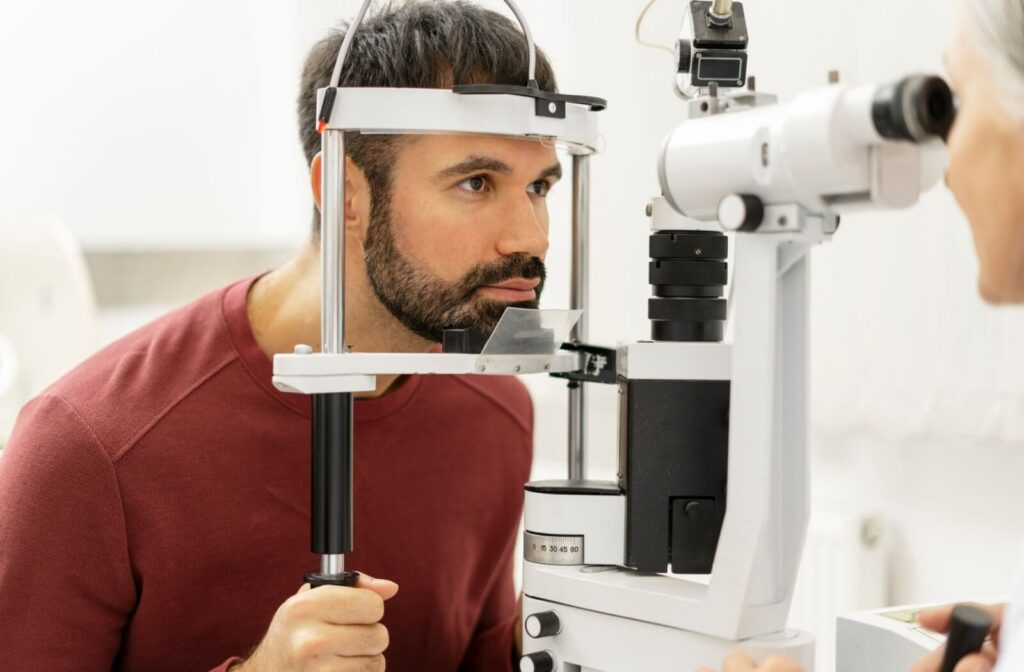Taking care of your eyes is about more than just clear vision; it’s about protecting the health and comfort of one of your most important senses. If you wear contact lenses, you should schedule a contact lens exam every year. This helps your lenses remain the right fit for your eyes and safeguards your vision from potential risks.
Whether you’re a long-time contact lens wearer or considering them for the first time, an annual exam is the key to long-term eye health and comfort.
Why Regular Eye Exams Are Crucial
Your eyes do so much more than process the world around you. They also reveal your overall health, often showing signs of underlying health issues before symptoms emerge. Many people assume their vision is fine if it’s stable and they aren’t experiencing discomfort, but that’s not always true. Regular exams are essential for maintaining eye health and diagnosing concerns while they’re still manageable.
Conditions like glaucoma, macular degeneration, and cataracts don’t usually show noticeable symptoms until significant damage has already occurred. Routine eye exams allow your optometrist to detect these problems early, giving you the best chance of protecting your vision through timely intervention.
Your eyes also provide a unique glimpse into the health of your entire body. Eye exams can uncover signs of high blood pressure, diabetes, or high cholesterol by revealing subtle changes in the blood vessels at the back of your eyes. This means regular appointments are as good for your whole body as they are for your eyes.
The Importance of Keeping Your Contact Lens Prescription Accurate
Using contact lenses with an out-of-date prescription isn’t just inconvenient; it’s unsafe. Your eyes change over time, and wearing lenses that no longer fit properly can cause irritation, discomfort, or even damage. Regular exams help your prescription reflect your current vision and any changes in your eye health.
If your lenses feel less comfortable than they used to, you experience blurry vision, or you notice redness or irritation, it’s time to book an exam.
Eye Exams vs. Contact Lens Exams
A routine comprehensive eye exam and a contact lens exam are all about putting focus on your unique needs. While both are essential, they serve distinct purposes in maintaining your eye health, such as:
- Comprehensive Eye Exams focus on assessing overall vision and detecting potential eye diseases or systemic health issues. These appointments include tests for visual acuity, muscle function, and eye health.
- Contact Lens Exams go a step further by tailoring care specifically for contact lens wearers. They include specialized tests to help your lenses fit comfortably and safely. These exams also take into account factors like the curvature of your cornea, your pupil size, and your tear film quality to ensure optimal lens performance.
When combined, these exams provide a complete picture of your eye health.
How Often Should You Get a Contact Lens Exam?
For most people wearing contact lenses, it’s recommended to have a contact lens exam once a year. For children or first-time lens wearers, your optometrist may suggest more frequent exams during the adjustment period, as their eyes tend to change more rapidly.
If you experience any discomfort, redness, or blurry vision between appointments, schedule an exam as soon as possible. These symptoms may indicate a problem with your lenses or underlying eye health concerns that need immediate attention.

What to Expect During a Contact Lens Exam
Scheduling a contact lens exam is the first step toward ensuring your lenses are the right fit for your eyes, but what happens once you’re there? Here’s a breakdown of what to anticipate:
Contact Lens Fitting
Contact lenses aren’t one-size-fits-all. Your optometrist will take precise measurements of your eyes to determine the right shape, size, and type of lens for you. Proper fit is crucial for comfort and ensuring your lenses function as they should.
For those with unique needs like severe astigmatism or dry eyes, you can get specialty lenses so you can still enjoy clear vision.
Measuring Corneal Curvature
Using tools like a keratometer or corneal topography device, your optometrist maps the surface of your cornea. If you have astigmatism, special toric lenses may be needed to provide a better fit and sharper vision.
Assessing Pupil & Iris Size
To ensure your lenses cover your eyes properly and maintain alignment, your optometrist will measure the size of your pupil and iris. This step is especially important for patients using specialized lenses like rigid gas-permeable (RGP) contacts.
Evaluating Your Tear Film
Your tear film plays a significant role in contact lens comfort. If dryness is a concern, your optometrist may recommend moisture-enhancing lenses or treatments to improve tear production.
Contact Lens Trials
Before finalizing your prescription, you’ll likely be given trial lenses to wear. This allows you to test how the lenses feel and perform in real-life conditions. Once the trial is successful, you’ll receive a finalized prescription and, in many cases, a follow-up appointment to check that everything is working perfectly.
When Should You Book Your Next Exam?
If you’re already wearing lenses, your yearly exam is essential to maintaining healthy, comfortable lens wear. But don’t wait if you’re experiencing discomfort, redness, or blurry vision. Early action can prevent minor issues from becoming major problems.
If you’re thinking about switching to a different type of contact lens, like dailies, multifocals, or specialty lenses, our knowledgeable team at Precision Eye Care can help you explore your options.
Your eyes work hard for you, and they deserve the perfect fit for your lifestyle. Book your contact lens exam today and invest in your long-term eye health!



